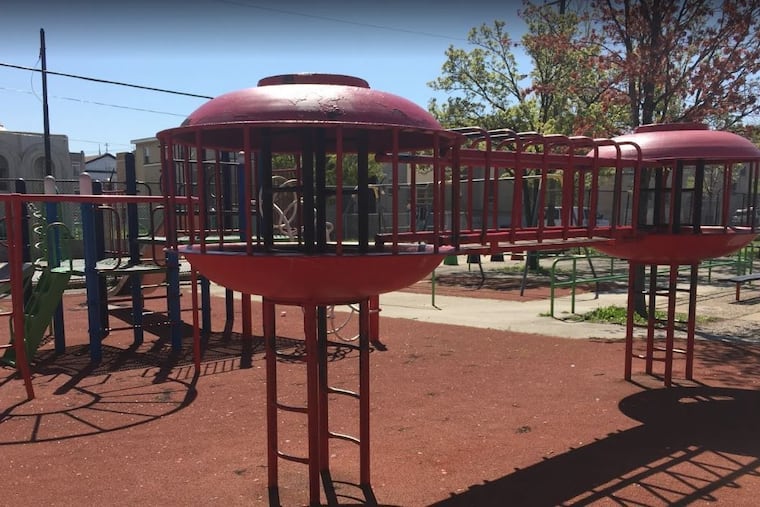Philadelphia finds lead contamination at two more playgrounds
The news comes after officials closed athletic fields at a Point Breeze playground just last week, after elevated levels of lead were found in the soil.

Lead, tied to numerous developmental problems in children, has been found at two more city playgrounds — East Poplar in North Philadelphia and Disston in Tacony, city officials said Wednesday.
Just last week, officials closed athletic fields at the Chew Playground in Point Breeze after elevated levels of lead were found in the soil. The rest of Chew remains open as the field is cleaned up.
East Poplar was closed immediately after testing showed lead in the paint used on playground equipment. The paint was likely applied by volunteers and was not approved by the Parks and Recreation Department, which does not use lead paint. The federal government banned the use of lead-based paint in homes in 1978; however, it is still available for some outdoor applications.
Paint containing lead also was found on playground equipment at Disston, but the park was already closed for construction.
Although that makes three city parks where lead was found in recent weeks, officials said there is no cause for alarm. Rather, they said, the parks, or areas within them, were closed “out of an abundance of caution.”
“There are no known cases of elevated blood lead levels in the city linked to outdoor exposure, like from parks, playgrounds, or dust in the air," said Caroline Johnson, deputy commissioner of the Philadelphia Department of Public Health.
The city agreed in 2017 to partner with the U.S. Environmental Protection Agency and the Pennsylvania Department of Environmental Protection to test playgrounds and parks for lead. Philadelphia’s industrial past includes former lead smelting operations, and some parks stand near those sites today.
Lead can be toxic if swallowed or inhaled, and poses the most threat to young children because their brains and nervous systems are developing.
Lead-based paint found in the home is typically the primary way children get exposed to the substance. But soil and dust can also pose dangers. The Inquirer detailed issues with lead exposure in its “Toxic City” series.
Johnson said any parent worried that a child has been exposed to lead should take the child to a pediatrician for a lead test. Free lead testing is available at the city’s District Health Centers.
The East Poplar playground is expected to reopen within three to four weeks after workers scrape, seal, and repaint the playground equipment, according to city officials. The 4.8-acre site also contains a pool, sports fields, and basketball and tennis courts. Lead was not found anywhere else at the site.
Equipment at Disston will also be addressed. The 25-acre park has walkways, tennis and basketball courts, and sports fields. It once served as a buffer between the now-defunct Disston Saw Works and the Tacony neighborhood. It is being rebuilt with new playground equipment. Lead was not found elsewhere on the site.
Lead was found at the northeast corner of the Chew Playground’s athletic field. Officials did not find lead at the playground equipment at Chew. Chew is spread over 2.8 acres with playground equipment, a pool, basketball court, athletic fields, and a community garden.
With the finding of lead paint at East Poplar and Disston, city officials said they plan to inspect all playground equipment and benches at city parks that were repainted within the last five years. Any equipment found to have been painted with non-city-issued paint will be closed to the public and remediated if needed.
City officials did not say how many parks they plan to test. However, they are testing parks within 1,000 feet of where smelting operations were known to have taken place.
“The health and safety of our children is Philadelphia Parks and Recreation’s top priority," said Kathryn Ott Lovell, the parks and recreation commissioner.